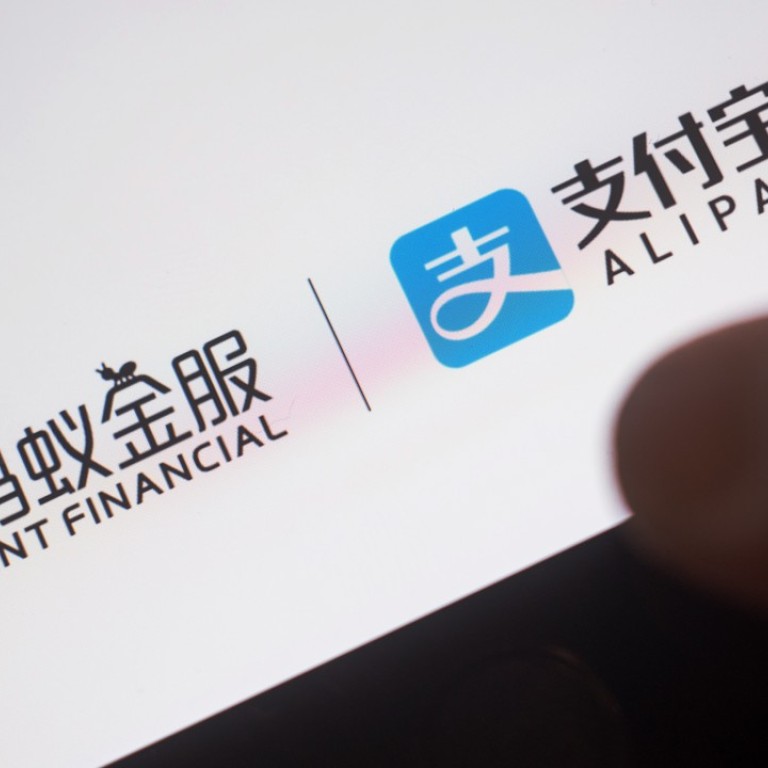
Ant Financial plans equity fundraising at potential US$100 billion valuation
A fundraising would bring Ant a step closer to a hotly anticipated initial public offering by establishing a more current valuation
China’s Ant Financial Services Group is planning to raise up to US$5 billion in fresh equity that could value the online payments giant at more than US$100 billion, people familiar with the move said.
A fundraising would bring Ant, in which e-commerce firm Alibaba Group Holding is taking a one-third stake, a step closer to a hotly anticipated initial public offering by establishing a more current valuation.
Ant’s last fundraising in 2016 valued the owner of Alipay, China’s top online payment platform, at about US$60 billion. The new round should start with a valuation of between US$80 billion to US$100 billion, the people said.
Ant is currently in talks to appoint advisers for the fundraising which is expected to be launched in the next couple of months, they added.
Ant declined to comment on its fundraising plans.
While no timetable for an IPO has been set, nor any location yet chosen, Ant’s plans are being viewed as a pre-IPO fundraising, the people said. A pre-IPO round is an increasingly common move by sought-after Chinese companies to establish valuations and widen their investor base ahead of going public.
It was not immediately clear how the company plans to use the fresh cash.
The exact timing and size of the fundraising still depends on investor feedback but any deal will add to an already hectic pace of domestic and offshore fundraising by Chinese tech firms that are looking to expand both at home and abroad.
Chinese e-commerce firm JD.com is raising funds for its logistics unit with a target of attracting at least US$2 billion, while live-video streaming start-up Kuaishou is nearing the close of a US$1 billion funding round, sources have said.
“The overall China (e-commerce) market is growing and Ant’s market share is very high,” said Hao Hong, head of research at brokerage Bocom International.
“So, even at a time like this, if Ant were to target US$5 billion, that will not be a problem,” he said, referring to the global stock market turmoil that has also hit Chinese equities, on track on Friday for their worst day in two years.
Ant’s own existing investments include stakes in Paytm, the Indian mobile payment and e-commerce website, and Thai financial technology firm Ascend Money.
Last month, however, Ant suffered a setback when a US government panel rejected its US$1.2 billion offer for money transfer company MoneyGram International over security concerns.
At home, in addition to its core online payments business, which Ant says has 520 million yearly users, the company also offers wealth management, credit scoring, micro lending and insurance services.
Last week, Alibaba announced it would take a 33 per cent stake in Ant – replacing the current system where Alibaba receives 37.5 per cent of Ant’s pre-tax profit – in what was viewed as an important step ahead of any IPO.
Alibaba set up Alipay in 2004, modelling the business on PayPal, to help Chinese buyers shop online, and later controversially spun it off ahead of its own listing in 2014. Jack Ma, Alibaba’s founder, controls Ant, according to Alibaba filings with the US Securities and Exchange Commission.
Ant, seen by some analysts as one of the most valuable Alibaba assets due to its unique position in Chinese e-commerce, saw its pre-tax profit more than triple from 2016 to 13.2 billion yuan (US$2.1 billion) in 2017, according to Alibaba’s latest financial filings.
Current shareholders in Ant include large state-owned institutions such as China Life Insurance, China Post Group – parent of Postal Savings Bank of China – and a unit of China Development Bank.
Alibaba owns the South China Morning Post.

